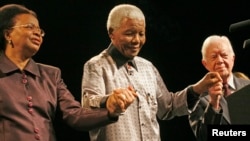With former U.S. President Jimmy Carter in hospice care at home, people around the world are reflecting on the 98-year-old's achievements and failures. Outside of the U.S., historians say one place where Carter paid close attention was Africa.
Carter has a unique relationship with the continent. He had a long-lasting connection to Africa, both during his term in office from 1977 to 1981, and in the many decades afterwards.
John Stremlau, honorary professor of International Relations at the University of Witwatersrand in Johannesburg, and former vice president for Peace Programs at the Carter Center, remembers Carter’s passion for the continent.
“Jimmy Carter told me on several occasions that he spent more time during his presidency on southern Africa and trying to liberate the populations down there than he did on Middle East peace,” said Stremlau.
Analysts say his interest in Africa was influenced by his upbringing in the rural southern U.S., which first made him aware of the evils of racism.
Carter’s presidency came at the height of the Cold War, but his handling of foreign policy in many ways differed from his predecessors, says Nancy Mitchell, historian and author of the book “Jimmy Carter and Africa: Race and the Cold War.”
For example, Carter made African-American U.N. Ambassador Andrew Young, who had been active in America’s civil rights movement, his point-man on the liberation struggle in what was then Rhodesia, now Zimbabwe.
Mitchell says the U.S. administration then spoke directly with Robert Mugabe and Joshua Nkomo, who were leading the guerilla war against white minority rule.
“So, it’s a really unusual example — I would say, in my knowledge, a unique example in the Cold War — where the United States treated leftist rebels who were either Communist or were certainly considered to be very left-leaning and supported by Communist states, with respect. Fully into negotiations from the beginning,” said Mitchell.
Zimbabwe won independence in 1980.
Where Carter had less success, analysts say, was in South Africa, where he might have taken a harder line on the apartheid regime, which he opposed morally, but needed on his side in Cold War considerations.
However, David Monyae, associate professor of political science and international relations at the University of Johannesburg, says Carter is generally appreciated in Africa as a progressive who had a human rights centered foreign policy and was more focused on African issues than many U.S. leaders.
“One would not compare him to Mandela, but, I mean, the two were friends, and they became members of the Elders team on African issues and global issues," said Monyae.
Like Mandela, Carter spent his post-presidency focused on health issues in Africa, achieving great success in efforts toward the eradication of guinea worm disease. His Carter Center was also instrumental in monitoring elections and promoting democracy across the continent.
Carter won the Nobel Peace Prize in 2002 for that work.




